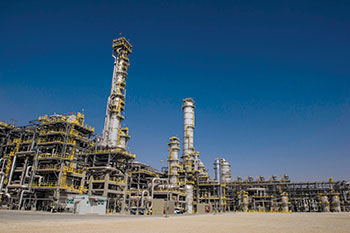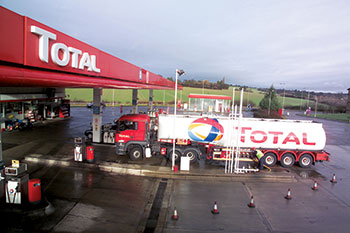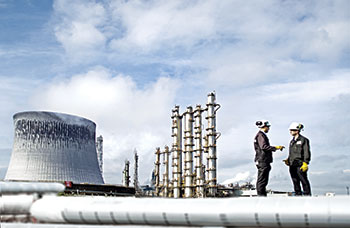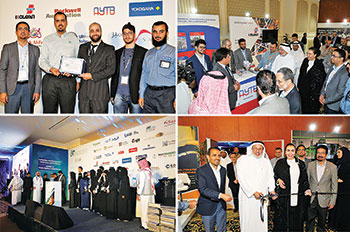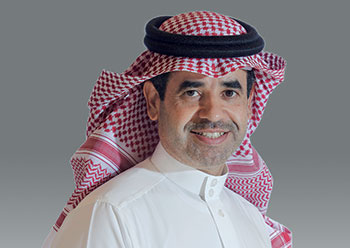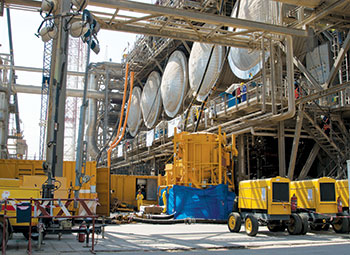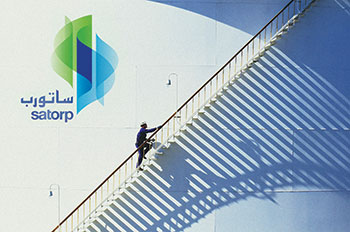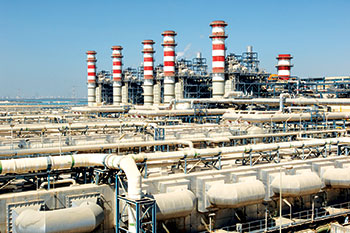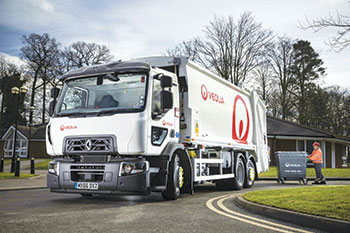
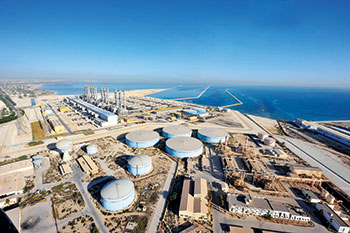 Jubail ... increasing Saudi Arabia’s industrial output
Jubail ... increasing Saudi Arabia’s industrial output
As they develop at a blistering pace, Saudi Arabia’s powerhouses Jubail and Yanbu’s combined output of petrochemical and refining products, among other items, feed the needs of local industries, leaving large volumes for export
Jubail and Yanbu, Saudi Arabia’s industrial powerhouses are seeing scorching development attracting an investment of more than $267 billion, with 630 industrial projects manufacturing close to 100 basic products.
According to the Gulf Petrochemcials and Chemcials Association (GPCA) website, the cities contribute 85 per cent of Saudi Arabia’s non-oil exports and produce about 10 per cent of global petrochemical products. They are home to 175,000 workers, 70,000 students and a host of investors from all over the globe.
It is estimated that the RCJY accounts for 65 per cent of industrial investment in the entire Gulf region and has a 20.2 per cent average annual growth rate in terms of foreign direct investment (FDI).
Yanbu Industrial City Economic Review says Jubail and Yanbu currently produce approximately 10 per cent of the world’s petrochemicals. RCJY, which is also now developing Ras Al Khair Industrial City, together contributes SR144.7 billion ($38.57 billion) or around 12 per cent to the kingdom’s GDP and to 65 per cent of the domestic industrial output.
The cities’ combined output of petrochemical and refining products, among other items, feed the needs of local industries, leaving large volumes for export. They are responsible for more than 71 per cent of total Saudi exports, while the non-oil exports of the commission cities amount to 85 per cent of all kingdom exports in that category.
 |
Nassif ... stewarding the growth of the cities |
The two cities are also home to some 630 manufacturing enterprises of which some 98 products have been deemed to be essential and the kingdom has benefited from the transfer of technology. Jubail and Ras Al Khair currently employ an estimated 140,000 people, which is predicted to rise to 190,000 by 2021.
RCJY has also launched an initiative to adopt renewable energy in Yanbu Industrial City, as part of the National Transformation Program 2020.
The RCJY added that SR595 million worth of investments were attracted to the Yanbu Industrial City, noting that the initiative aims to attract industrial investments of more than SR1.5 billion until 2025.
Alaa Nassif, the CEO of Royal Commission for Jubail and Yanbu (RCJY), recently signed five contracts at a value of SR163.05 million ($43.47 million) for establishments and developments in Yanbu Industrial City.
Nassif signed two contracts at a value of SR49.98 million, and SR16.93 million, respectively, for the third and fourth phases of developing a main road in Yanbu, according to the Saudi Press Agency (SPA).
Another agreement was signed to rehabilitate and process warehouses and workshops in Al Mihan district worth SR8.62 million, followed by a contract to maintain and operate RCJY’s computers at SR21.75 million. The CEO signed a contract for the settlement of land in the multi-logistics area worth SR65.78 million.
Earlier, in a related move, the RCJY signed four development contracts worth SR436.4 million. As per the first contract, the RCJY will offer geotechnical examinations regarding the soil in the extension area of Yanbu Industrial City at a total value of SR5.4 million, according to a statement.
The second deal signed was regarding the supply and installation of equipment for RCJY’s colleges and institutions in Yanbu at a value of SR11.22 million.
The establishment of family housing in Al Nakheel district is a part of the third agreement worth SR42.81 million, while the fourth included designing and setting up an electric power distribution station 8H at a value of SR376.93 million.
 |
Marafiq ... growth avenues in sight |
Clearly, the cities are emerging as one of the kingdom’s favoured locations for new industrial development. The cities’ development story got a further push in June last year, when the Saudi government set the second highest budget for RCJY at SR41.5 billion ($11.06 billion) along with tough targets, as it rolled out the National Transformation Program 2020 (NTP) across 24 Saudi governmental bodies.
Among the targets that has been set under the NTP for the RCJY, the most important ones include: increasing the number of value-added manufacturing products by 19 per cent from 432 to 516 different products; increasing RCJY’s cities industrial production by 23 per cent from 252 million tonnes to 309 million tonnes; and increasing the private sector’s new investments in industrial cities by 55 per cent from SR681 billion to SR1.07 trillion.
The cities contain Saudi Arabia’s leading petrochemical and minerals clusters and are a main contributor to the country’s economic growth. Jubail is home to Sadara Chemical Company (Sadara), the world’s largest chemical complex ever built in a single phase, while Ras Al Khair is building the world’s largest aluminium smelter – and Saudi Arabia’s first. The smelter is the cornerstone of Ras Al Khair Industrial City, which is fast becoming the country’s aluminium and phosphate centre, 90 km north of Jubail.
RCJY cities’ competitive package of land, utility and infrastructure services, coupled with easy access to markets, makes it a must for consideration for any firm looking to expand its footprint in the Gulf region.
Marafiq is the power and water utility lifeline to the industrial cities of Jubail and Yanbu, which are growing at a rapid pace and hence, present new growth avenues to the utility company as well.
Headquartered in Jubail Industrial City, Saudi Arabia, Marafiq provides utility services to the industrial, commercial and residential customers in the industrial cities of Jubail and Yanbu in Saudi Arabia. The company has a regional office in Yanbu and a representative office in Riyadh.
As a private power and water utility company, it carries out generation, transmission and distribution of power; production and distribution of potable and process water from seawater; and supply of seawater for cooling for industries. Marafiq also conducts treatment of sanitary and industrial wastewater and undertakes the operation, maintenance, management, expansion and construction of seawater cooling systems, desalinated and treated water systems, sanitary and industrial wastewater systems and electric power systems.
Marafiq’s foundations were laid in the 1970s when the Saudi government established the Royal Commission to develop the two industrial cities of Jubail and Yanbu. The objective was to diversify the national economy and reduce the kingdom’s reliance on its oil revenue by providing the requisite infrastructure and facilities for the establishment of primary, secondary and support industries.
The Royal Commission established the power and water infrastructure in Jubail and Yanbu, comprising a power station in Yanbu, seawater cooling facilities, desalination plants and wastewater treatment plants. By 1999 the ball was set rolling to privatise these utilities. Council of Ministers Decision 57 of July 11, 1999 defined the charter of a new private utility company, leading to the establishment of Marafiq by Royal Decree in October 2000. All the utility assets run by the Royal Commission were transferred to Marafiq, and the new company started operating commercially on January 1, 2003.
A vertically integrated structure, compliance with quality management system and efficient shareholding structure have strengthened the company’s business, even as regulatory nature of its operations could limit its growth. Nevertheless, the company could benefit from growing energy and water market and new industrial developments, said GlobalData in a report.
The new industrial developments of Jubail II and Yanbu II present new growth avenues to Marafiq. These two cities are growing at a rapid pace and hence, the company is also planning to further diversify or expand its operations.
On the company’s website, Saud Bin Abdullah Bin Thunnayan Al-Saud, the chairman of Marafiq, said: "The power and water industry plays a key role in Saudi Arabia’s national development strategy. With an annual growth rate target of 7.5 per cent, the value of the electricity, gas and water sector is set to grow to more than SR21 billion ($6 billion) in the next few years, accounting for almost 2 per cent of the gross domestic product."
"As the first private integrated power and water utility company in the kingdom, Marafiq finds itself spearheading the national drive to privatise public enterprises that are economically viable and sustainable. In particular, it supports the national development plan of providing opportunities to finance, operate and maintain utility services in the power and water sector.
"Marafiq is the utility lifeline to the industrial cities of Jubail and Yanbu. These two cities are a beacon of light on the kingdom’s journey of national economic development and privatisation.
"In a relatively short space of time, Marafiq has succeeded admirably in laying a solid foundation as a private enterprise with a customer-focused approach. It can look forward with confidence to continue building on its strong foundation of competitiveness, and to realise its vision to be the preferred supplier of utility services in the kingdom," he adds.
Meanwhile, work on Jubail Two Industrial City, termed as one of the largest civil engineering projects in the world, is in full swing and will considerably expand the size of the industrial city once it is completed in 2023.
Work on the project has been divided into four stages. The Royal Commission of Yanbu and Jubail has chosen Bechtel as the consultant after the firm successfully handled the Jubail One project, according to Zohair Al Ghamdi of leading online projects portal saudiprojects.net.
Work on the project valued at SR14 billion ($3.73 billion) started 2004 and infrastructure work is currently under way. The city is located northwest of Jubail One.
Al Ghamdi says the scope of works include the construction of a railway line to transport gas; and pipelines to transport chemical products from Jubail Two Industrial City to King Fahad seaport. The seaport too will be expanded to provide more space for stock and equipment.
The industrial city will have seven residential districts, namely: Al Surouge, Al Mardumah, Al Fasil, Al Mutrafiah, Al Deffl, Al Reggah and Al Jalmudah. This will add another 120,000 people to the city’s existing population.
A road network with a total length of 860 km will be constructed as will be 63 bridges. Also being expanded is the city’s central air-conditioning capacity.
Bechtel’s scope of works also includes providing education facilities – including an 18,000-student ‘greenfield’ university – medical centres, and power, water and waste facilities.
About 25 per cent of Jubail Two will be reserved for industries. The city is categorised into three zones. The primary industries’ zone will have plants that produce primary chemical products, such as acetic acid, styrene, methanol, aromatics, ethylene oxide, cunene, VCM, VAM, ethanol, ammonia, EDC, LAO, olefins, etc.










































































